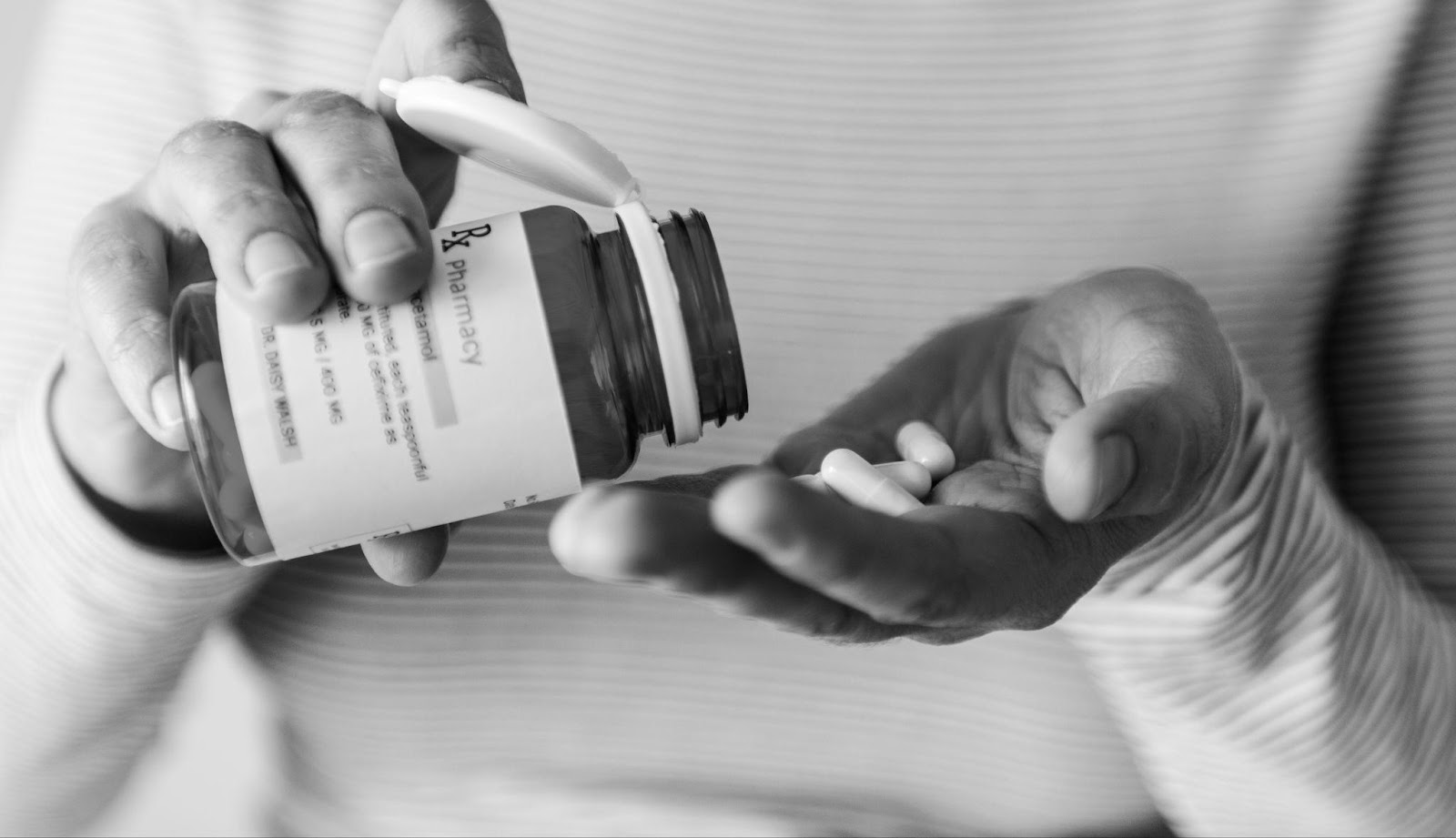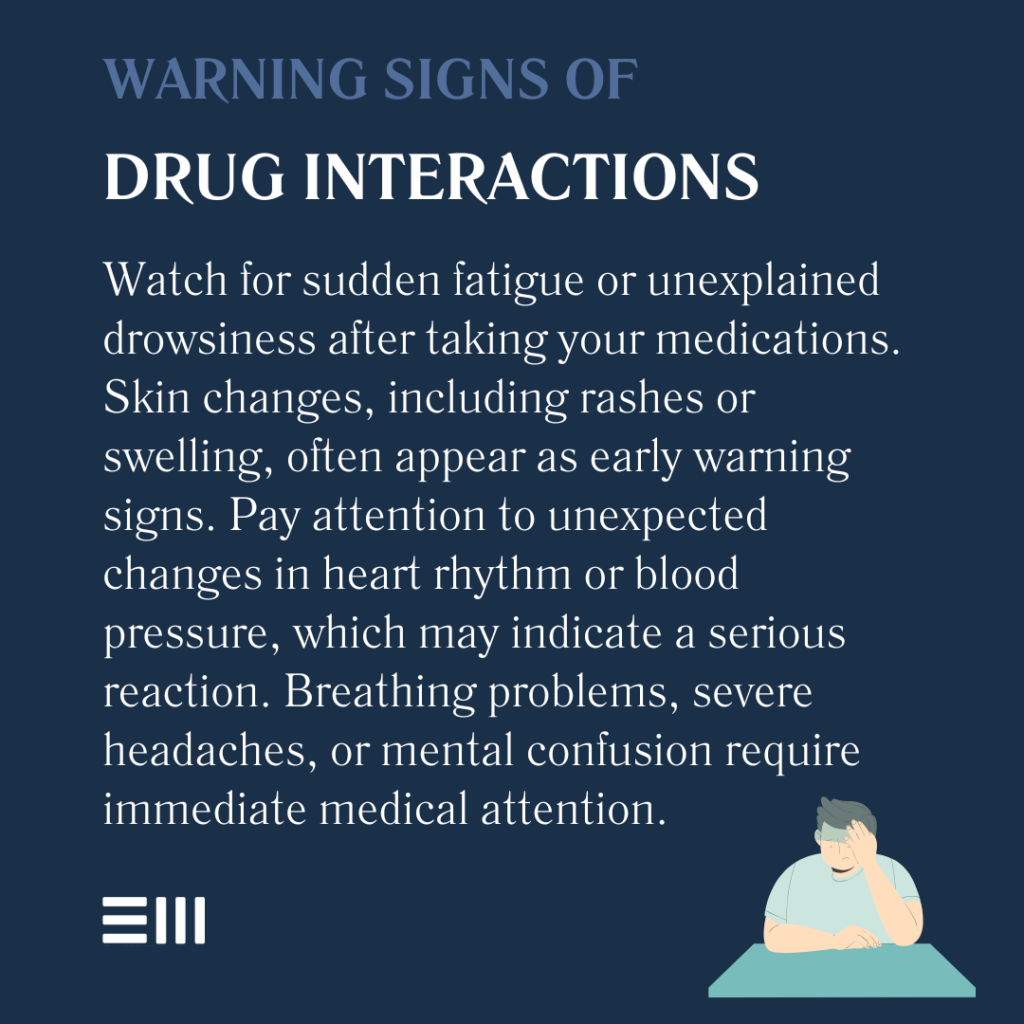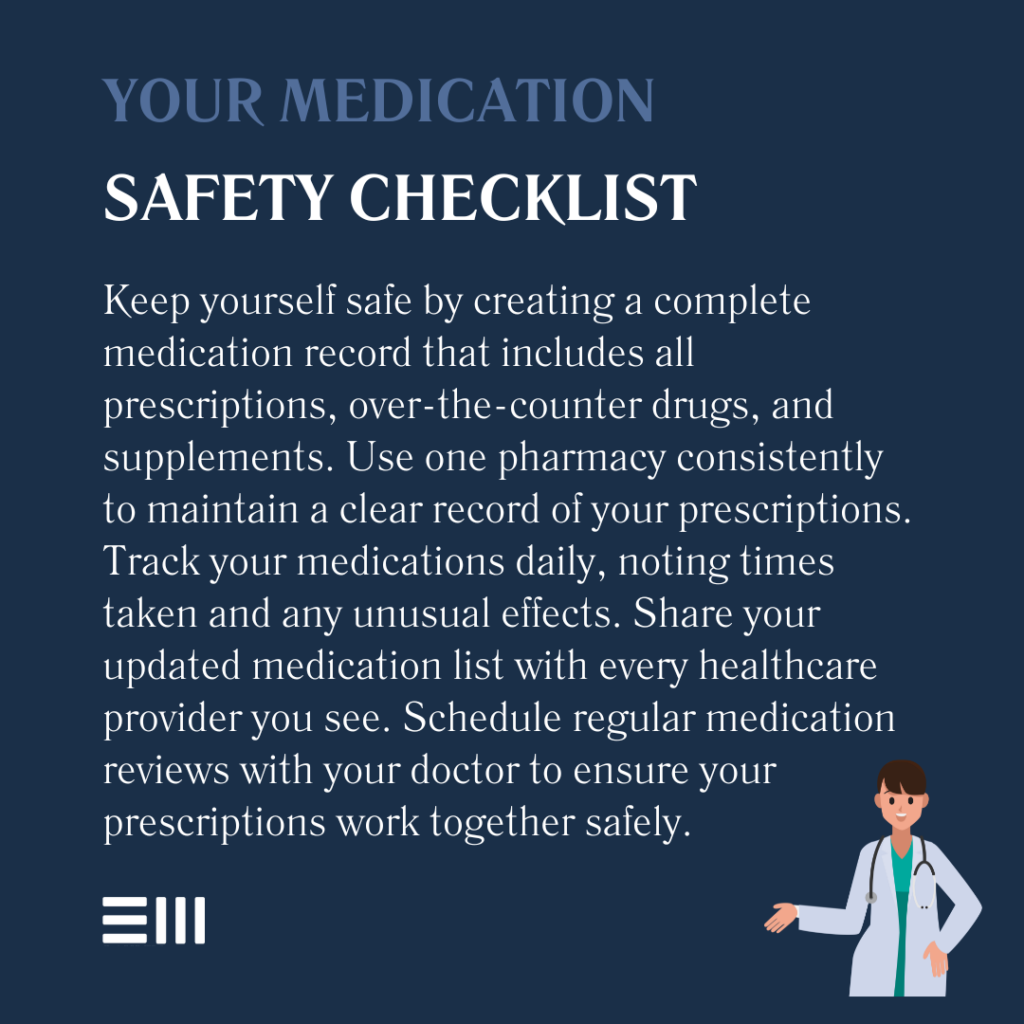
Every year, over 1.3 million Americans visit emergency rooms due to adverse drug reactions, with many of these cases stemming from preventable medication interactions.
Behind each statistic lies a story of someone whose trust in their medical care was shaken by an unexpected and dangerous drug reaction.
Even more concerning, studies show that adverse drug reactions are now the fourth leading cause of death in the United States, surpassing pulmonary disease, diabetes, and pneumonia.
Understanding Drug Interactions
Drug interactions occur when medications interfere with each other or with other substances, potentially leading to harmful effects.
Before diving into specific types of interactions, it’s important to understand that even common medications can pose serious risks when combined incorrectly.
The complexity of modern medicine means that many patients take multiple medications, increasing their risk of dangerous interactions.
- Drug-drug interactions between prescription medications;
- Interactions between prescription and over-the-counter drugs;
- Drug-food interactions;
- Drug-alcohol interactions;
- Drug-supplement interactions;
- Drug-disease interactions (when medications worsen existing conditions);
- Timing-related interactions (when medications affect each other’s absorption); and
- Genetic interactions (when genetic factors affect drug metabolism).
Understanding these potential interactions can help prevent serious health complications and ensure safer medication use. Remember that even seemingly harmless combinations can lead to significant health risks.
Common Signs of Adverse Drug Reactions
When medications interact negatively, your body may display various warning signs. Recognizing these symptoms early can help prevent more serious complications.
The severity of reactions can range from mild discomfort to life-threatening emergencies.
- Severe nausea or unexpected digestive issues;
- Unusual fatigue or drowsiness;
- Skin reactions (rashes, itching, swelling);
- Changes in heart rhythm or blood pressure;
- Unexplained pain or discomfort;
- Mental status changes;
- Breathing difficulties;
- Severe headaches;
- Dizziness or balance problems;
- Changes in urination patterns;
- Muscle weakness or tremors;
- Vision changes or eye problems;
- Unexplained bruising or bleeding; and
- Mood changes or anxiety.
If you experience any of these symptoms after starting a new medication or combining medications, seek immediate medical attention.
Quick action can prevent severe complications and long-term health effects.

High-Risk Medications and Combinations
Certain medications carry a higher risk of dangerous interactions. Understanding these common culprits can help you stay vigilant about your medication safety.
The FDA maintains a list of high-risk medications that require additional monitoring and precautions.
- Blood thinners (warfarin, heparin, apixaban);
- Diabetes medications (insulin, metformin, sulfonylureas);
- Heart medications (beta-blockers, ACE inhibitors, statins);
- Anti-seizure drugs (phenytoin, carbamazepine, valproate);
- Antibiotics (fluoroquinolones, macrolides, aminoglycosides);
- Antidepressants (SSRIs, MAOIs, tricyclics);
- NSAIDs (ibuprofen, naproxen, aspirin);
- Opioid pain medications (hydrocodone, oxycodone, morphine);
- Immunosuppressants (prednisone, methotrexate, cyclosporine); and
- Mental health medications (antipsychotics, mood stabilizers).
Always inform your healthcare providers about all medications you’re taking, including over-the-counter drugs and supplements. Some combinations can be particularly dangerous, leading to severe health consequences.
Prevention Strategies
Taking proactive steps to prevent drug interactions can save lives and prevent serious health complications.
Consider implementing these safety measures in your medication routine.
Research shows that patients who actively manage their medications have significantly lower rates of adverse reactions.
- Maintain an updated list of all medications, including doses and schedules;
- Use a single pharmacy for all prescriptions to ensure comprehensive medication review;
- Inform all healthcare providers about your current medications and supplements;
- Read medication labels carefully, including warnings and contraindications;
- Ask about potential interactions when starting new medications;
- Keep a medication diary noting any unusual effects or symptoms;
- Use medication-tracking apps or tools to manage complex schedules;
- Schedule regular medication reviews with your healthcare provider;
- Store medications properly to maintain their effectiveness;
- Never share prescriptions with others, even if symptoms are similar;
- Learn about your medications’ common side effects and interactions; and
- Consider genetic testing for medication metabolism if recommended.
Following these preventive measures can significantly reduce your risk of experiencing adverse drug reactions. Regular communication with your healthcare team remains essential for medication safety.

Understanding Your Rights
When harmful drug interactions occur, patients have specific legal rights that protect them from negligent prescribing practices or inadequate warnings about medication risks.
These rights are established through federal and state laws designed to ensure patient safety.
- Right to informed consent about medication risks and alternatives;
- Right to accurate medication information and proper labeling;
- Right to proper medical screening for interactions and contraindications;
- Right to appropriate monitoring of drug therapy;
- Right to compensation for damages from negligent prescribing;
- Right to access your medical records and prescription history;
- Right to seek second opinions about medication regimens;
- Right to report adverse reactions to regulatory authorities;
- Right to refuse medications or request alternatives;
- Right to privacy regarding medication history; and
- Right to emergency care for adverse reactions.
These rights ensure that patients can make informed decisions about their healthcare and seek recourse when standards of care aren’t met. Understanding your rights helps you advocate for safer medication management.
Frequently Asked Questions About Drug Interactions
Many patients have questions about medication safety and their legal rights regarding adverse drug reactions.
Here are answers to common concerns we encounter.
How Do I Know if I’m Experiencing a Drug Interaction?
Watch for unexpected symptoms after starting new medications or changing doses. Common signs include unusual fatigue, digestive issues, or skin reactions.
What Should I Do if I Suspect an Adverse Drug Reaction?
Seek immediate medical attention and document your symptoms. Keep all medication bottles and maintain a detailed record of when symptoms began.
Can Over-the-Counter Medications Cause Serious Interactions?
Yes, even common over-the-counter medications can interact dangerously with prescription drugs or other substances.
How Long After Starting a New Medication Can Interactions Occur?
Drug interactions can occur immediately or develop over time. Some reactions may take days or weeks to become apparent.
Are Natural Supplements Safe to Take with Prescription Medications?
Many natural supplements can interact with prescription medications. Always consult your healthcare provider before combining them.
Take Action to Protect Your Health and Rights
If you’ve experienced adverse effects from drug interactions, don’t face the challenges alone.
Our experienced legal team understands the complexities of medication-related injuries and can help you understand your options for seeking compensation and justice.
We work tirelessly to hold pharmaceutical companies and healthcare providers accountable for medication safety failures.
Can't find what you're looking for? Search our site below.










